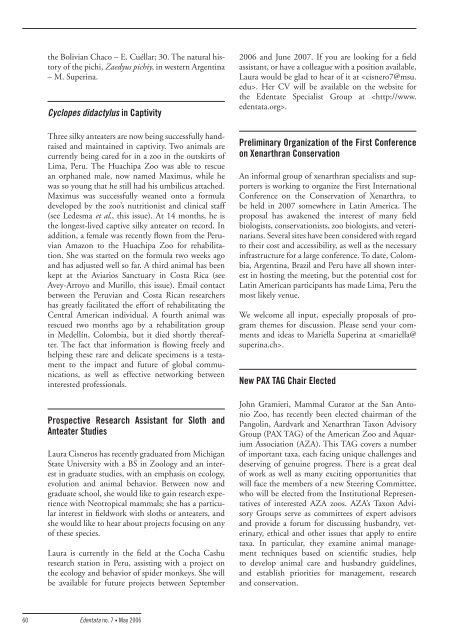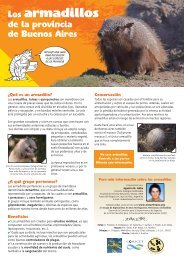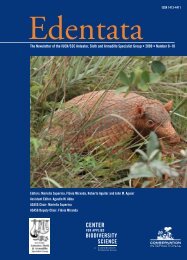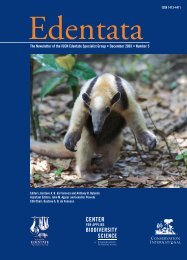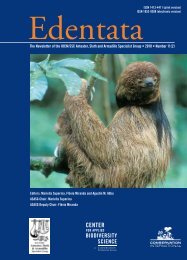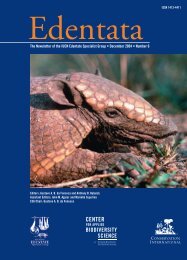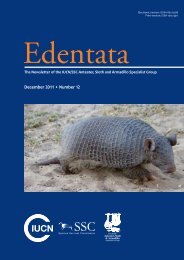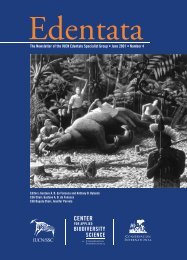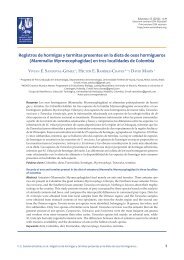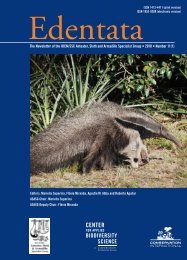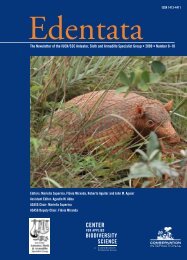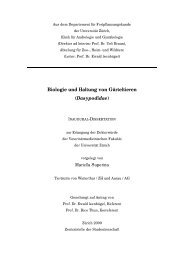Edentata 7 - Anteater, Sloth & Armadillo Specialist Group
Edentata 7 - Anteater, Sloth & Armadillo Specialist Group
Edentata 7 - Anteater, Sloth & Armadillo Specialist Group
- No tags were found...
You also want an ePaper? Increase the reach of your titles
YUMPU automatically turns print PDFs into web optimized ePapers that Google loves.
the Bolivian Chaco – E. Cuéllar; 30. The natural history<br />
of the pichi, Zaedyus pichiy, in western Argentina<br />
– M. Superina.<br />
Cyclopes didactylus in Captivity<br />
Three silky anteaters are now being successfully handraised<br />
and maintained in captivity. Two animals are<br />
currently being cared for in a zoo in the outskirts of<br />
Lima, Peru. The Huachipa Zoo was able to rescue<br />
an orphaned male, now named Maximus, while he<br />
was so young that he still had his umbilicus attached.<br />
Maximus was successfully weaned onto a formula<br />
developed by the zoo’s nutritionist and clinical staff<br />
(see Ledesma et al., this issue). At 14 months, he is<br />
the longest-lived captive silky anteater on record. In<br />
addition, a female was recently flown from the Peruvian<br />
Amazon to the Huachipa Zoo for rehabilitation.<br />
She was started on the formula two weeks ago<br />
and has adjusted well so far. A third animal has been<br />
kept at the Aviarios Sanctuary in Costa Rica (see<br />
Avey-Arroyo and Murillo, this issue). Email contact<br />
between the Peruvian and Costa Rican researchers<br />
has greatly facilitated the effort of rehabilitating the<br />
Central American individual. A fourth animal was<br />
rescued two months ago by a rehabilitation group<br />
in Medellín, Colombia, but it died shortly thereafter.<br />
The fact that information is flowing freely and<br />
helping these rare and delicate specimens is a testament<br />
to the impact and future of global communications,<br />
as well as effective networking between<br />
interested professionals.<br />
Prospective Research Assistant for <strong>Sloth</strong> and<br />
<strong>Anteater</strong> Studies<br />
Laura Cisneros has recently graduated from Michigan<br />
State University with a BS in Zoology and an interest<br />
in graduate studies, with an emphasis on ecology,<br />
evolution and animal behavior. Between now and<br />
graduate school, she would like to gain research experience<br />
with Neotropical mammals; she has a particular<br />
interest in fieldwork with sloths or anteaters, and<br />
she would like to hear about projects focusing on any<br />
of these species.<br />
Laura is currently in the field at the Cocha Cashu<br />
research station in Peru, assisting with a project on<br />
the ecology and behavior of spider monkeys. She will<br />
be available for future projects between September<br />
2006 and June 2007. If you are looking for a field<br />
assistant, or have a colleague with a position available,<br />
Laura would be glad to hear of it at . Her CV will be available on the website for<br />
the Edentate <strong>Specialist</strong> <strong>Group</strong> at .<br />
Preliminary Organization of the First Conference<br />
on Xenarthran Conservation<br />
An informal group of xenarthran specialists and supporters<br />
is working to organize the First International<br />
Conference on the Conservation of Xenarthra, to<br />
be held in 2007 somewhere in Latin America. The<br />
proposal has awakened the interest of many field<br />
biologists, conservationists, zoo biologists, and veterinarians.<br />
Several sites have been considered with regard<br />
to their cost and accessibility, as well as the necessary<br />
infrastructure for a large conference. To date, Colombia,<br />
Argentina, Brazil and Peru have all shown interest<br />
in hosting the meeting, but the potential cost for<br />
Latin American participants has made Lima, Peru the<br />
most likely venue.<br />
We welcome all input, especially proposals of program<br />
themes for discussion. Please send your comments<br />
and ideas to Mariella Superina at .<br />
New PAX TAG Chair Elected<br />
John Gramieri, Mammal Curator at the San Antonio<br />
Zoo, has recently been elected chairman of the<br />
Pangolin, Aardvark and Xenarthran Taxon Advisory<br />
<strong>Group</strong> (PAX TAG) of the American Zoo and Aquarium<br />
Association (AZA). This TAG covers a number<br />
of important taxa, each facing unique challenges and<br />
deserving of genuine progress. There is a great deal<br />
of work as well as many exciting opportunities that<br />
will face the members of a new Steering Committee,<br />
who will be elected from the Institutional Representatives<br />
of interested AZA zoos. AZA’s Taxon Advisory<br />
<strong>Group</strong>s serve as committees of expert advisors<br />
and provide a forum for discussing husbandry, veterinary,<br />
ethical and other issues that apply to entire<br />
taxa. In particular, they examine animal management<br />
techniques based on scientific studies, help<br />
to develop animal care and husbandry guidelines,<br />
and establish priorities for management, research<br />
and conservation.<br />
60<br />
<strong>Edentata</strong> no. 7 • May 2006


